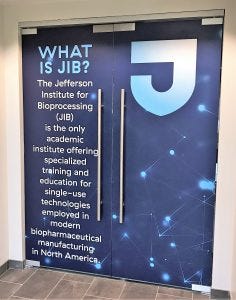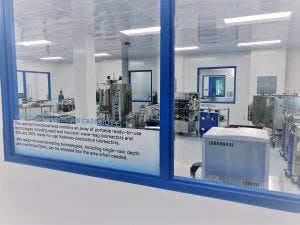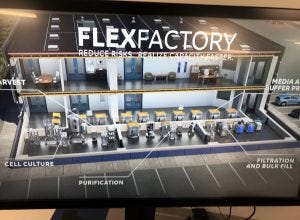
The Jefferson Institute for Bioprocessing (JIB) has opened its doors in Pennsylvania. Bioprocess Insider visited to find out how the site, supported by Ireland’s NIBRT and GE Healthcare, will aid the bioprocess industry.
In June 2018, plans were laid down for a site in Pennsylvania for an education and training institute to support the staffing gaps in the bioprocessing space. A year on, the Jefferson Institute for Bioprocessing (JIB) has opened, with help from a $7 million (€6.2 million) investment and support from vendor GE Healthcare.
The institute, located about 20km north of Philadelphia at the Spring House Innovation Park in Lower Gwynedd, invited this publication to visit days after its opening ceremony.

JIB aims to plug the bioprocess staffing shortage
Executive director Parviz Shamlou has a passion about teaching and training. With 30 years of industry experience, including in roles at Eli Lilly and Company and the Keck Graduate Institute (KGI), he told us the biggest risk in the biopharma industry is the lack of trained bioprocessing staff. JIB, therefore, hopes to plug some of the staffing gaps through training programs targeted at both local students and industry itself.
“There is no shortage of people wanting training,” he said. JIB is part of the Jefferson (Philadelphia University and Thomas Jefferson University) network and so has direct access to those in higher education and research, but he added the institute is also looking to bring onboard the local and regional community colleges.

Meanwhile within Pennsylvania there are a plethora of biopharma companies needing bioprocess technicians. Cell and gene therapy firms of Spark and WuXi AppTec have homes there, as do many other pharma and services firms. And as pipelines continue to be tipped in favor of large molecules, there is demand for reskilling staff in biologics.
Shamlou said that while production processes between small and large molecule are different, there are many similarities when it comes to QC, analytical skills and regulatory knowhow. Furthermore, its easier to retrain those involved with small molecules to large molecules than the other way around, he added.
Irish influence and single-use
The institute benefits from its partnership with Ireland’s National Institute for Bioprocessing Research and Training (NIBRT), a center that opened in 2011 through €60 million ($68 million) of government funding.

The so-called ‘flight simulator for biomanufacturing’ trains over 4,000 people a year from its site in Dublin, and through an exclusive license agreement JIB will be able to tap NIBRT’s curriculum and training program to train – initially – around 2,500 people.
NIBRT was originally equipped with stainless steel equipment, but in 2017 it opened a second training center based on single-use equipment through a partnership with bioprocess vendor GE Healthcare.
JIB, presently, operates as a Single-Use Centre of Excellence through a similar partnership with GE. The site runs as a GE FlexFactory, offering training on flexible disposable technologies across the up- and down-stream.
GE’s involvement supports the training programs and will help to create a future market, executives from GE told us during the visit, but from JIB’s point of view the choice of vendor plays second fiddle to ensuing it teaches the basic principles of bioprocessing.

JIB is a GE Healthcare FlexFactory
“Our job is to teach you how to drive the car, not which car to buy,” Ron Kander, dean of the Kanbar College of Design Engineering and Commerce, who helped forge the agreement with NIBRT and develop JIB, said.
Initial programs are already being carried out by GE Healthcare staff, training JIB employees on how to use the single-use equipment. The first two courses for industry will begin in July, we were told.
About the Author
You May Also Like

schedl_b_and_w.jpg?width=100&auto=webp&quality=80&disable=upscale)
schedl_b_and_w.jpg?width=400&auto=webp&quality=80&disable=upscale)



